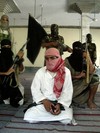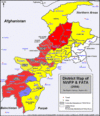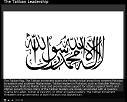Less than two months after the Pakistani government negotiated a peace agreement with the local Taliban in the Mohmand tribal agency, the region is now under “complete control” of extremists led by Omar Khalid.
Mohmand Taliban commander Omar Khalid “is the strongest and most influential Taliban leader after Baitullah Mehsud and Maulvi Faqir,” residents told Daily Times, referring to the leader and deputy leader of the Movement of the Taliban in Pakistan.
Khalid has become the dominant Taliban commander in Mohmand after defeating the Shah Sahib group, a rival pro-Taliban group. The Shah Sahib group is an offshoot of the banned Lashkar-e-Taiba that operates in Mohmand and across the border in Afghanistan’s Kunar province. The Lashkar-e-Taiba took part in the July 13 attack on a US outpost across the border in Afghanistan’s Nuristan province, and has conducted numerous high-profile terror attacks inside Pakistan, Kashmir, and India.
Khalid’s forces killed 10 members of the Shah Sahib group and captured another 80. Among those killed were Muslim Khan, the leader of the Shah Sahib group, and Mullah Obaidullah, the deputy leader.
|
Mohmand went red after the government signed a peace agreement with the Taliban in May. The government signed peace agreements in the red agencies/ districts; purple districts are under de facto Taliban control; yellow regions are under Taliban influence. |
Baitullah Mehsud, who recruited the Shah Sahib group into the Pakistani Taliban just days before the fighting, is said to have been angered by Khalid’s actions. Baitullah is said to have sent emissaries to Mohmand to investigate the incident. Khalid said he would release the prisoners after Baitullah promised Lashkar-e-Taiba members were no longer in the tribal agency.
The Mohmand Taliban took control of the tribal agency after the Pakistani government negotiated a peace agreement with the extremists at the end of May 2008. The deal required the Taliban to renounce attacks on the Pakistani government and security forces. The Taliban said it would maintain a ban on the activities of nongovernment organizations in the region but agreed not to attack women in the workplace if they wear the veil. Both sides exchanged prisoners.
The Taliban promptly established a parallel government in Mohmand. Sharia or Islamic courts were formed and orders were given for women to wear the veil in public. “Criminals” were rounded up and judged in sharia courts. Women were ordered to have a male escort at all times and prevented from working on farms. The Taliban also kidnapped members of a polio vaccination team.
The Pakistani government has been powerless to stop the rise of the Taliban in Mohmand. The government postponed a planned operation at the beginning of July at the behest of Mohmand tribal leaders. Limited operations in neighboring Khyber and Hangu ended after little more than a week of activity.
|
Multimedia presentation of the senior Taliban commanders in Pakistan and Afghanistan. Click to view. |
Background on Omar Khalid
Omar Khalid’s involvement with terrorism stretches back at least a decade. Before becoming involved in jihadi circles, Khalid was a journalist at pro-Islamist news outlets. In the 1990s, he joined the Harakat-ul-Mujahideen, a banned terrorist group that conducts terror attacks against Indian forces in Jammu and Kashmir.
Khalid trained in terror camps in Kashmir and fought against Indian forces. He maintained close links with the Kashmiri terror outfits but also looked to contribute to the Taliban cause inside Afghanistan.
Immediately after the US invasion of Afghanistan in 2001, Khalid took hundreds of fighters across the border to fight US forces. His forces still enter Afghanistan to attack US and Afghan forces in the east. He is said to closely coordinate operations with Bajaur’s Faqir Mohammed, a close ally of senior al Qaeda leaders including Ayman al Zawahiri.
Last year, Khalid claimed to have 3,000 armed and trained fighters under his command. This year, Khalid said he has 26,000 Taliban fighters under his command.
In July 2007, Khalid’s forces seized a historic mosque and shrine in the Mohmand tribal agency and renamed it the Lal Masjid, or Red Mosque, after the Taliban mosque in Islamabad that was assaulted by the government in mid-July.
Khalid denied links with the Taliban and al Qaeda even as he pledged allegiance to Red Mosque leader Ghazi Abdur Rashid. “If [the Taliban] come to us, we will welcome them,” said Khalid. “We will continue Ghazi Abdur Rashid’s mission even if it means sacrificing our lives.” Khalid also threatened to “use suicide bombers in self defense” if the new Red Mosque was raided. He seeks to “Islamize” the local tribes and plans establishing a “vice and virtue force.”
But Khalid has since joined the Movement of the Taliban in Pakistan, the umbrella Taliban organization led by Baitullah Mehsud that united disparate groups in the tribal areas and the settled districts of the Northwest Frontier Province. Khalid is the Taliban’s representative for Mohmand agency.











1 Comment
How many “peace treaties” and other agreements have men like these broke? Too many to count. So, is anyone surprised? This guy is a target, and the faster he’s done in the better. NATO, especially the members who refuse to engage in combat ops, better wake up. After driving them out of A-stan, they got it better than ever in Pakistan. Get this guy, wherever he is.